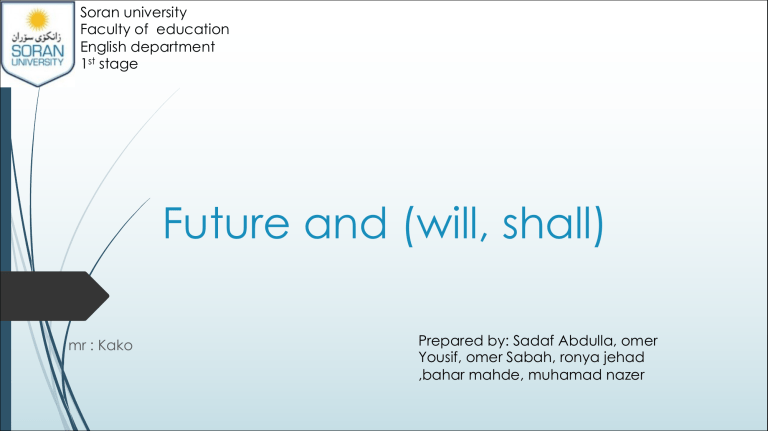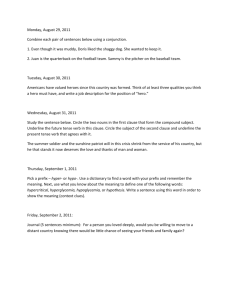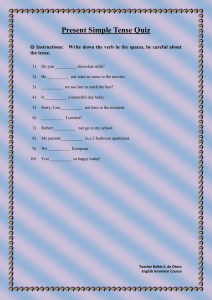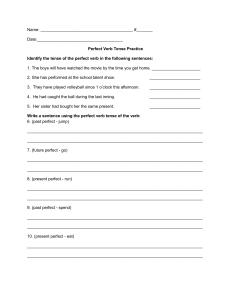
Soran university Faculty of education English department 1st stage Future and (will, shall) mr : Kako Prepared by: Sadaf Abdulla, omer Yousif, omer Sabah, ronya jehad ,bahar mahde, muhamad nazer Future : The near future expresses what is going to take place or what the subject is going to do in the not-too-distant future. In some instances, the present tense is used to imply a near future event or action. The simple future is a verb tense that’s used to talk about things that haven’t happened yet ex This year, Jen will read War and Peace. It will be hard, but she’s determined to do it. And in the future, most of the time( will, shall) these two will be seen let’s talk about what and how they’re used Will: The most basic and common form used to express the future is ‘will’. Negative I You He She It We They Question positive forms Wil stay ll stay will I Yoy He She It We They I You He She It We They Will not stay Won’t stay Ex Stay? He will be You will not speak Will they teach? will – use We use will to talk about things that we think will happen in the future. • He will love your new coat. • They won’t win this match. Note that it’s common to use will with the expressions I think, I don’t think, I hope, etc, or also with I’m sure, I’m not sure, perhaps, etc. • I hope they will arrive soon. • I don’t think they‘ll win. • I’m sure you‘ll be fine. • Perhaps I‘ll be late. We use will for promises or refusals. • I will lend her the money. • I won’t help you. We use will when we make decisions at the moment of speaking (instant decisions). • A: There’s no milk in the fridge. • B: I’ll go to the shop to buy some more. • A: This box is very heavy. • B: Don’t worry. I’ll help you. Don’t use We never use the future tense in time clauses (introduced by phrases like “after”, “as soon as”, “before”, etc.) in English. Should we need to express the idea of something happening, say, after something else in the future, we use the present tense in the time clause and the future tense or a command in the main clause. Ex I will give it to him after he arrives. I will give it to him after he will arrive. As soon as you get the email, let me know, please. As soon as you get the email, please let me know. In the cases in which “when” doesn’t introduce an adverbial time clause, we do use “will” when expressing the future. When will you know the results? When do you know the results? When we use “when” as a conjunction introducing a time clause, the same rule as for other time clauses applies: I’ll call you when I come home. I’ll call you when I will come home. Shall Shall comes first in the verb phrase (after the subject and before another verb). We use it mostly with I and we: Shall I…? Shall we…? We use Shall I…? or I’ll when we offer to do things for other people. • Shall I make some coffee? (=Do you want me to make coffee?) • I‘ll make some coffee. We use Shall we…? to suggest doing something. • Shall we go to the cinema? (=Do you want to go to the cinema?) Use – shall We use ‘shall’ in the following ways: a) to make offers using I/we • • Shall I make some lunch? Shall we help you with your bags? b) to make suggestions using I/we • Shall we go to the park later? • Shall we have something to eat? c) to express formal obligations • Applicants shall provide evidence of their qualifications. • Guests shall not remove anything from the rooms. d) to make a promise • • • I shall never forget the help you gave me. I shan’t be late. We shall do everything we can to solve the problem. e) to describe the future very formally We shall overcome this difficult moment. The tests shall be carried out by an independent body. Don’t use shall As a general rule, use 'will' for affirmative and negative sentences about the future. Use 'will' for requests too. If you want to make an offer or suggestion with I/we, use 'shall' in the question form. For very formal statements, especially to describe obligations, use 'shall'.




